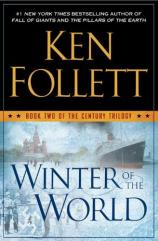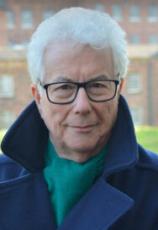Winter of the World: Book Two of the Century Trilogy
Review
Winter of the World: Book Two of the Century Trilogy
WINTER OF THE WORLD, the eagerly awaited sequel to Ken Follett’s internationally bestselling FALL OF GIANTS, is the second in a trilogy that will chronicle the 20th century, considered by many to be the most violent in history. Follett, who has brought us sweeping historical sagas such as PILLARS OF THE EARTH and EYE OF THE NEEDLE, brings to life how revolution, a global plague, two world wars separated by a financial depression, holocaust, and the introduction into the atomic age have shaped our turbulent present --- a present that, in many respects, may seem to be repeating history’s mistakes.
Some of us may be old enough to have lived through the era from 1931 to 1949, covered in the new book, or have heard stories from our elders. Follett created families of varying social classes and political perspectives from England, Wales, Germany, Russia and America in Book One. Through their offspring in Book Two, he brings vividly to life the effects of these events on civilians and soldiers alike.
"No one is more uniquely qualified than Follett --- through his gift for dramatic narrative, nuanced character development, and historical accuracy --- to look at the broad picture of the 20th century and its impact on our youthful 21st."
Germany in the early 1930s is besieged by joblessness and poverty as a result of the global depression following the stock market crash of 1929. The Rise of the Third Reich starts as Adolf Hitler begins his rise to power with promises to rebuild roads, jobs and industry. He successfully follows through on some of his promises at the expense of indigents, immigrants, the aged and ailing, and even the intellectuals, leading ultimately to genocide throughout Western Europe. His ambition for world domination leads him to invade Poland, France and England. America, struggling to recover from the same financial debacle, keeps its collective head down. American policy makers and industrialists are divided among allegiance with Fascist Generalissimo Franco in Spain, Hitler and Great Britain. It is not until Japan bombs Pearl Harbor in late 1941, more than a year after England has suffered the infamous blitzkrieg from German bombers, that the United States chooses a side and puts its wealth and industrial strength together to back England.
Follett draws us intimately into not just the battles but also into the personal lives of participants in the struggle. Daisy Peshkov, daughter of a Russian immigrant gangster, Lev, now a movie mogul whose fortune was derived from Prohibition-era bootlegging, moves to England to leave her family’s checkered past behind her. She succeeds in marrying into England’s titled class, then finds herself in the midst of the London blitz.
Carla and Fritz, daughter and son of English noblewoman Maud Fitzherbert and Walter von Ulrich, a German former diplomat, struggles to keep her family alive in Berlin as American allies from the West and Russia from the East close in for the kill. Her impressionable younger brother, Fitz, joins the Nazi youth and then, disillusioned with Fascism, becomes a fanatical Communist. Woody and Chuck Dewar, sons of a United States senator, are drawn into war and politics in Europe and the South Pacific. In Russia, Vladimir Peshkov, son of Lev Peshkov’s brother, Grigori, marries a scientist, and both become involved in nuclear espionage as America develops the atomic bomb.
Among the book's memorable moments: Follett takes us inside the Manhattan project in Chicago to observe the first chain reaction as scientists construct the first pile of deadly materials for a leap into the unknown. We are clandestine observers in a German hospital for disabled children and aged adults, admitted for experimental treatments. We look over the shoulder of a code breaker seeking to break cyphers from Japanese warships as they crawl across the Pacific toward Pearl Harbor.
There are literally thousands of historical fiction and nonfiction publications detailing the Great Depression and World War II. History buffs would be especially wary of any attempt to encapsulate these cataclysmic events into a concise narrative whose primary purpose is to recreate the personal insights of fictional characters into dramatic prose. No one is more uniquely qualified than Follett --- through his gift for dramatic narrative, nuanced character development, and historical accuracy --- to look at the broad picture of the 20th century and its impact on our youthful 21st. His exhaustive historical research for this and 20 other historical novels covering events from the 12th century through the present enriches our knowledge and experience.
Reviewed by Roz Shea on September 20, 2012
Winter of the World: Book Two of the Century Trilogy
- Publication Date: September 18, 2012
- Genres: Fiction, Historical Fiction
- Hardcover: 960 pages
- Publisher: NAL Trade
- ISBN-10: 0451419243
- ISBN-13: 9780451419248










